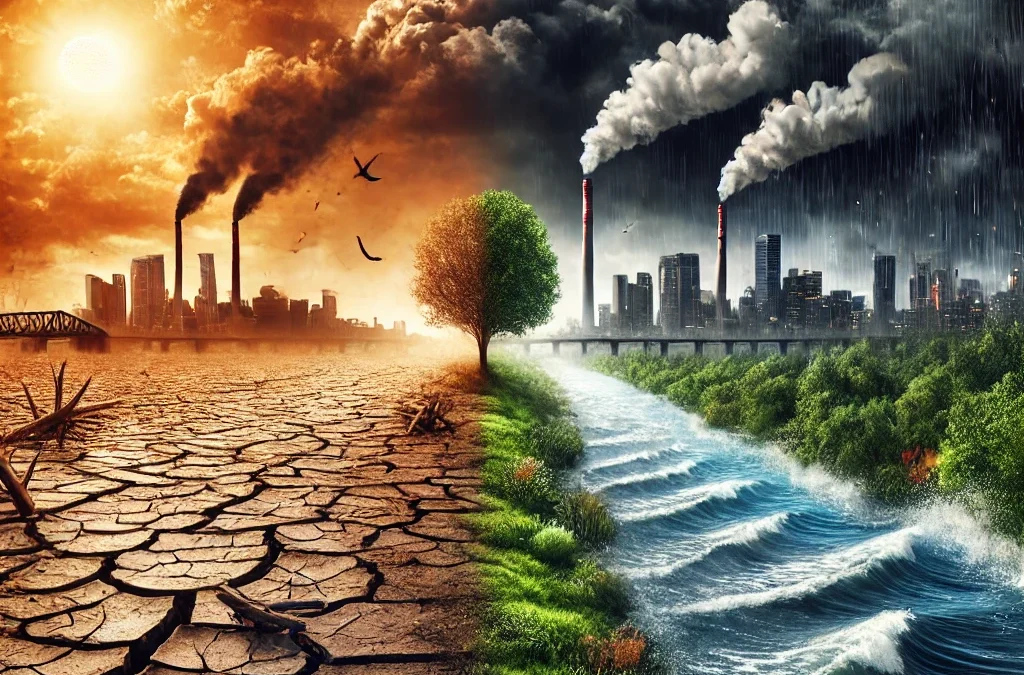Climate Change Inaction: Why the World Is Falling Behind in the Fight Against a Global Crisis
Climate change represents one of the most urgent challenges of the 21st century, with potentially devastating consequences for ecosystems, economies, and societies across the globe. Despite the overwhelming scientific consensus on the human-caused nature of climate change and its rapidly escalating effects, meaningful action has been slow, piecemeal, and often insufficient. In the face of extreme weather events, rising global temperatures, and melting ice caps, the question remains: why hasn’t the world taken decisive action to address this existential threat?
This article explores the reasons behind climate change inaction, the political and economic forces at play, and the critical steps that must be taken to avoid the worst consequences of this global crisis.
The Science of Climate Change
To understand the consequences of inaction, it is crucial to grasp the science behind climate change. The planet’s climate is warming, primarily due to the buildup of greenhouse gases—carbon dioxide (CO₂), methane (CH₄), and nitrous oxide (N₂O)—in the atmosphere. These gases trap heat from the sun, leading to a “greenhouse effect” that increases global temperatures.
According to the Intergovernmental Panel on Climate Change (IPCC), human activities, particularly the burning of fossil fuels for energy, deforestation, and industrial agriculture, are the primary drivers of this greenhouse gas accumulation. Since the pre-industrial era, global temperatures have risen by approximately 1.2°C (2.2°F), with consequences already being felt around the world.
The impacts of this warming are vast and varied:
- Rising Sea Levels: Melting polar ice and glaciers are causing sea levels to rise, threatening coastal communities and ecosystems.
- Extreme Weather: Climate change is driving more frequent and severe weather events, including hurricanes, floods, droughts, and wildfires.
- Ecosystem Disruption: Warming temperatures and changing precipitation patterns are altering habitats, leading to species migration, extinction, and the loss of biodiversity.
- Human Health Risks: Climate change is exacerbating air pollution, increasing the spread of diseases, and creating health risks associated with heatwaves and water shortages.
Despite the clear evidence of these impacts, global efforts to reduce greenhouse gas emissions and mitigate climate change have been insufficient. Several factors contribute to this inaction.
Economic and Political Barriers to Climate Action
1. Fossil Fuel Dependency
One of the most significant barriers to climate action is the world’s dependence on fossil fuels—coal, oil, and natural gas—as primary energy sources. Fossil fuels account for approximately 80% of global energy consumption, powering transportation, electricity generation, and industrial activities.
The fossil fuel industry is deeply entrenched in the global economy, providing jobs, energy security, and revenue for governments. As a result, powerful fossil fuel companies and industry groups have significant political influence, often lobbying against climate policies that threaten their business models. In 2021 alone, fossil fuel companies spent hundreds of millions of dollars on lobbying efforts to oppose environmental regulations and promote policies favorable to their industry.
Moreover, fossil fuel subsidies—government financial support for the production and consumption of fossil fuels—remain a major obstacle to transitioning to cleaner energy. The International Monetary Fund (IMF) estimates that global fossil fuel subsidies amount to $5.9 trillion annually, effectively incentivizing the continued use of polluting energy sources.
2. Political Polarization
In many countries, particularly the United States, climate change has become a highly politicized issue. While there is broad scientific agreement on the reality and causes of climate change, political divisions often shape public perception and policy responses.
In the U.S., for example, climate change denial or skepticism is more prevalent among conservative political leaders and their constituents. Some view climate action as an overreach of government regulation or a threat to economic growth. This polarization has made it difficult to pass meaningful climate legislation at the federal level, even as individual states and cities take action.
Political polarization on climate change is not unique to the U.S. In countries like Brazil and Australia, political leaders have downplayed the urgency of climate action, often prioritizing economic development and resource extraction over environmental protection. This has led to the weakening of environmental regulations and a rollback of commitments to reduce emissions.
3. Short-Term Economic Interests
One of the most significant challenges in addressing climate change is that its worst effects are often perceived as distant in the future, while the economic costs of transitioning to a low-carbon economy are immediate. Reducing greenhouse gas emissions requires substantial investments in renewable energy, infrastructure, and technology. It also involves phasing out fossil fuel industries that provide jobs and tax revenue.
For many policymakers, the short-term economic risks of climate action—such as job losses in fossil fuel sectors, higher energy prices, and the costs of transitioning to green technologies—can outweigh the long-term benefits of mitigating climate change. This focus on short-term economic interests often leads to a “wait and see” approach, where action is deferred in favor of maintaining the status quo.
Moreover, the global nature of climate change presents a collective action problem. Since the effects of emissions are felt globally, individual countries may be reluctant to take aggressive action if they believe other nations will not follow suit. This “free rider” problem can lead to a lack of coordinated global action, as countries prioritize their economic interests over collective climate goals.
4. The Influence of Corporate Lobbying
The role of corporate lobbying, particularly from industries that contribute heavily to greenhouse gas emissions, is a critical factor in climate inaction. Fossil fuel companies, industrial agriculture, and heavy manufacturing industries have long resisted environmental regulations that would require them to reduce emissions or pay for the environmental costs of their operations.
In the U.S., the fossil fuel lobby is particularly powerful, spending millions of dollars each year to influence lawmakers and promote policies that favor continued reliance on oil, coal, and natural gas. Industry groups have also been instrumental in funding climate change denial campaigns, creating doubt about the scientific consensus on climate change and delaying public support for action.
Additionally, many companies have employed greenwashing tactics—publicizing minor environmental initiatives while continuing to engage in practices that contribute to climate change. This allows corporations to appear environmentally conscious while avoiding substantive changes to their business models.
5. Inequitable Impacts of Climate Change
Another challenge in addressing climate change is the unequal distribution of its impacts. Developing countries, which have contributed the least to global emissions, often suffer the most severe consequences. Low-income nations in Africa, Southeast Asia, and the Pacific Islands are particularly vulnerable to rising sea levels, extreme weather events, and disruptions to agriculture.
Despite this, wealthy countries—the primary emitters of greenhouse gases—have been slow to provide the financial and technical support needed to help developing nations adapt to climate change. Climate finance, which was pledged in the Paris Agreement to help poorer countries mitigate and adapt to climate impacts, has fallen short of the $100 billion annual goal.
This inequity also plays out within countries, where marginalized communities—such as low-income households, people of color, and Indigenous populations—are disproportionately affected by climate change. These communities are often more vulnerable to extreme weather events and are less likely to have the resources to recover from climate-related disasters.
The Role of International Agreements: Paris and Beyond
One of the most significant achievements in the global fight against climate change is the Paris Agreement, adopted in 2015. The agreement marked a historic commitment by nearly every country in the world to limit global warming to well below 2°C (3.6°F) above pre-industrial levels, with an aspirational goal of keeping warming below 1.5°C.
The Paris Agreement operates on a system of nationally determined contributions (NDCs), in which countries voluntarily set their own targets for reducing greenhouse gas emissions. However, the agreement has significant limitations:
- Non-Binding Commitments: The Paris Agreement lacks enforcement mechanisms. While countries are required to submit NDCs, there are no penalties for failing to meet targets. As a result, many countries have set targets that are insufficient to meet the 1.5°C goal, and some have failed to implement the policies needed to reach their targets.
- Insufficient Ambition: Current NDCs, even if fully implemented, are projected to lead to a global temperature increase of approximately 2.7°C by the end of the century, well above the threshold for avoiding catastrophic climate impacts. The IPCC has warned that to keep warming below 1.5°C, global emissions must be reduced by 45% by 2030 and reach net-zero by 2050.
- Withdrawal and Delays: The U.S. withdrawal from the Paris Agreement in 2017 under the Trump administration dealt a significant blow to global climate efforts. Although the U.S. rejoined the agreement in 2021, the delay in action during those critical years hindered progress.
The Consequences of Inaction
The consequences of continued inaction on climate change are dire. The IPCC’s most recent reports paint a grim picture of a world that fails to take meaningful action:
- Extreme Weather Events: More frequent and intense hurricanes, floods, droughts, and heatwaves will become the new norm, leading to widespread destruction, displacement, and loss of life.
- Rising Sea Levels: By the end of the century, sea levels could rise by more than 1 meter (3 feet), displacing millions of people living in coastal areas and leading to the loss of entire nations, particularly small island states.
- Food and Water Insecurity: Climate change will disrupt global food and water supplies, leading to increased hunger, malnutrition, and conflict over resources. Agricultural yields could decline by up to 30% in some regions, and water shortages could affect billions of people.
- Biodiversity Loss: Up to one million species are at risk of extinction due to climate change and habitat destruction. The loss of biodiversity will have cascading effects on ecosystems, food security, and human health.
- Economic Costs: The economic costs of inaction are staggering. According to the 2020 Lancet Countdown report, the global economy could lose up to $23 trillion by 2050 due to climate-related damages, while the cost of inaction far exceeds the cost of taking decisive action now.
What Needs to Happen: A Path Forward
Addressing climate change requires coordinated global action, ambitious policies, and a fundamental transformation of energy systems, economies, and societies. Here are key steps that must be taken:
1. Rapid Decarbonization
The world must transition away from fossil fuels to renewable energy sources, such as wind, solar, and geothermal. This requires massive investments in clean energy infrastructure, as well as policies that phase out coal, oil, and gas while promoting energy efficiency and electrification in transportation, buildings, and industry.
2. Strengthening International Cooperation
Countries must strengthen their commitments under the Paris Agreement, raising the ambition of their NDCs to meet the 1.5°C goal. Wealthy nations must also provide financial and technical support to developing countries to help them transition to clean energy and adapt to climate impacts.
3. Climate Finance and Just Transitions
Governments must prioritize climate finance, ensuring that funds are directed to the most vulnerable communities, both globally and domestically. A just transition framework should also be implemented to support workers and communities that rely on fossil fuel industries, providing retraining programs, social protections, and economic diversification.
4. Policy Reform and Corporate Accountability
Strong policy frameworks are needed to regulate emissions, including carbon pricing, emissions trading systems, and strict regulations on industrial polluters. Corporations must also be held accountable for their role in driving emissions, and greenwashing practices must be scrutinized to ensure that companies are genuinely reducing their carbon footprints.
Conclusion
Climate change inaction is a multifaceted issue, shaped by economic interests, political polarization, and the influence of powerful industries. The stakes are high, and the consequences of failing to act are already being felt around the world. However, it is not too late to prevent the worst impacts of climate change. By taking bold and immediate action, transitioning to clean energy, and holding polluters accountable, the world can still limit global warming and build a more sustainable and equitable future. The time for inaction has passed; the time for transformative climate action is now.



